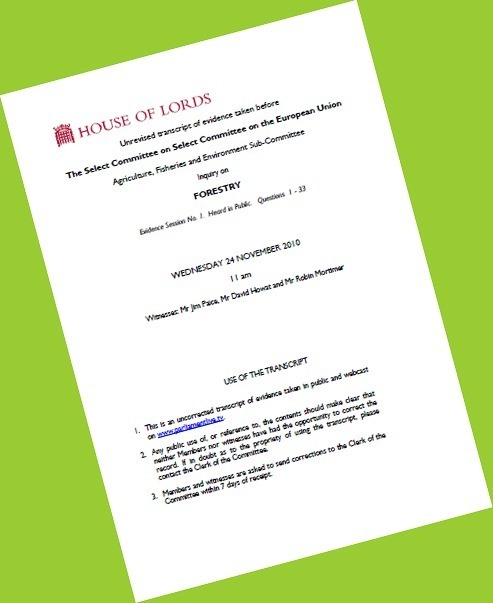
The recent Inquiry on Forestry contains multiple references to the proposed sell-off the the public forest estate in England but has gone largely unnoticed.
The House of Lords Select Committee on the European Union Agriculture, Fisheries and Environment Sub-Committee met on 24th November to hold an Inquiry on Forestry.
Members examined Mr Jim Paice MP (Minister of State for Agriculture and Food, Defra), Mr David Howat (Director of Forestry Commission England], and Mr Robin Mortimer (Director of Climate Change Adaptation at Defra).
Some highlights:
- The Public Bodies Bill is needed to enable sales of over 15% of the current estate. Concerns were expressed that the reform of the Forestry Acts could extend beyond the public forest estate sell-off.
- Forest Research, the scientific arm of the Forestry Commission, seems to be safe.
- Several options will be offered in a public consultation early next year. I wrote about this in my last post.
- Public sector organisations were viewed as being more than capable or running the forest estate for the benefit of the public, and “some probably better than the Forestry Commission”.
- Money from the sales will not be reinvested in forestry.
- Grants may encourage management but changes in the tax regime may also be being considered.
- On afforestation an interesting discussion on EU support revealed some lack of knowledge regarding opportunities for incentivising new planting in England. More Pillar II money could in the future be directed to forestry (currently 80% to the environment through agricultural schemes).
- Afforestion is likely to be the future focus for the Forestry Commission in England, acting as an ‘enabling body’.
There is a lot of interesting information in the published minutes and I make no excuse for reproducing at some length below, some of the key quotes, questions and responses:
Mr Jim Paice MP: The Forestry Commission is in the Public Bodies Bill to provide us with the opportunities for changes which, I am more than happy to admit, are not fully formed in our minds.
Mr Jim Paice MP: I need to make it clear that we are not proposing to abolish the Forestry Commission or anything like that. Clearly, however, if we go down the road of significant disposals, that will have an impact in its establishment and how it goes about its work.
Mr Jim Paice MP: My overall vision is that, in England, the Commission should become much more an enabling body. … I want to see a significant increase in forested area in England. I believe that, for all the public benefit reasons that we can come back to, that needs to happen. In order to achieve that, we need to focus the Commission much more on an enabling role and move it away from managing a significant part of the forest estate in England.
Mr Jim Paice MP: We do not have any hard and fast proposals about disposals at this stage. We will be publishing a consultation document in the early part of the new year, when we intend to lay out a range of options. We will by then probably have it down to one or two favoured options, but there will be a range. Obviously, the extremes are, at one end, the total sale of the Commission list as private forestry estate to some other body such as a charitable trust, or whatever. The other extreme is a piecemeal sale over a period of time to the highest bidder of individual parcels of woodland or forest.
The Earl of Caithness: One side of the Forestry Commission that is respected is the research side. What plans have you got for its future?
Mr Jim Paice MP: Its continuation. We have no plans to change it. Obviously, it will be part of the continuing structure of the Forestry Commission at this stage.Lord Cameron of Dillington: As you know, Minister, the Public Bodies Bill is going through this House at the moment. Most of us are slightly mystified by Clauses 17 and 18 on the Forestry Commission. Reading between the lines of what you say, your present intention is to have a disposal of a part, or a considerable part, of the Forestry Commission lands. I would personally not disagree with that. I think a lot of that land would probably be better managed in private hands than public hands. However, you seem to be saying to us legislators, “We are not quite sure what we want to do with the Forestry Commission, but we want you to give us permission to do it anyway”. I find that quite strange. I wonder if you have slightly firmer views as to where you are going here.
Mr Jim Paice MP: Yes, indeed. Part of our policy is clearly established: we wish to proceed with, to correctly use your word, very substantial disposal of public forest estate, which could go to the extent of all of it. As I said earlier, the precise detail of who it will go to and in what form is yet to be decided. ….
In order to have substantial disposal, we need to change the law. Our lawyers advise us that up to about 15% of the forest could be sold without risk of transgression of current legislation, which requires the Commission to own and manage the public estate. To get beyond that, we would need to change the law. That is the reason for it.
Lord Cameron of Dillington: However, the powers you are looking for in the Bill go considerably beyond the right to sell. That is why I find it slightly difficult to know how to vote, as it were.The Earl of Arran: Following on from Lord Cameron’s question, in the event of the disposal of some of the Forestry Commission land, do you have any worry about foreign purchases?
Mr Jim Paice MP: I have worries about two or three potential aspects of disposal, which we are looking at very carefully. Foreign purchases are one, although I not think that they are automatically necessarily bad. Indeed, we could not prevent them under EU law. I am much more concerned about the possibility of established forest being bought by energy companies who would proceed to chip it all for energy recovery. That is not, in my view, a very good use of prime timber. We will need to look at how we prevent that.
The other aspect that concerns me is the point made by the British processing sector, mainly the saw mills, whereby, although the Forestry Commission has only 18% of English forest land, it comprises the vast bulk of their raw material. They have long-term contracts of supply, and it enables them to continue to process in good times and bad, when, perhaps, the private sector might stop felling when prices are low. I am very conscious that there are issues in our proposals that we are looking to address.Mr Jim Paice MP: The decision to move towards substantial, large-scale disposal of the forestry estate is based on a number of issues. First, there has been, as some of your Lordships have already implied, a view from some sectors that the Forestry Commission need not be owning all the public forestry estate. Secondly–and I am not going to avoid the issue–there is a need for capital receipts. It is a very substantial sum of public investment. Thirdly, we genuinely feel, and I feel very strongly, that it is nonsense to believe that the huge public benefits can only somehow be achieved under state ownership. We have some first class woodland charities–I name but one in the Woodland Trust, but there are others, particularly active in Scotland–who own large tracts of English woodland and manage it in a way that is just as good, and I would argue probably better, than the Forestry Commission. There is the concept of local community ownership for local woodlands. There is of course a huge interest in the private sector for amenity woodlands. We have seen over the past few years that a lot of small woodlands have been bought by private individuals who want to own prime, commonly semi-ancient, woodland of their own.
However, all the protections remain in place. We are not going to lose any woodland cover through any of these proposals.

Gabriel Hemery
 This work is licensed under a Creative Commons Attribution- NonCommercial- NoDerivs 3.0 United States License.
This work is licensed under a Creative Commons Attribution- NonCommercial- NoDerivs 3.0 United States License.
